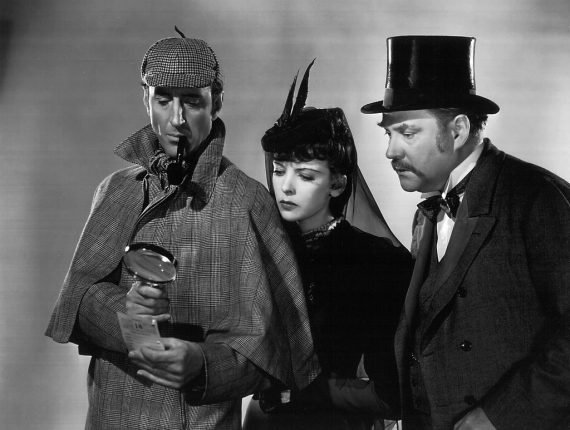Federal Judge Rules That Most Of Sherlock Holmes Is Now Public Domain
Thanks to a Federal District Court Judge, most of Sherlock Holmes is now in the public domain.
A U.S. District Court Judge in Illinois ruled earlier this week that most of the content and characters from the Sherlock Holmes stories created by Sir Arthur Conan Doyle are now in the public domain under U.S. Copyright Law, meaning that independent filmmakers and script writers are free to use and adapt the material as they wish without seeking permission or making payment to the Estate of Sir Arthur Conan Doyle:
In the more than 125 years since he first appeared, Sherlock Holmes has popped up everywhere from fan fiction set in outer space to screen adaptations like CBS’s “Elementary,” set in contemporary Manhattan. But now, following a legal ruling, the deerstalker-wearing detective is headed to another destination: the public domain.
A federal judge has issued a declarative judgment stating that Holmes, Watson, 221B Baker Street, the dastardly Professor Moriarty and other elements included in the 50 Holmes works that Arthur Conan Doyle published before Jan. 1, 1923, are no longer covered by United States copyright law, and can therefore be freely used by others without paying any licensing fee to the writer’s estate.
The ruling came in response to a civil complaint filed in February by Leslie S. Klinger, the editor of the three-volume, nearly 3,000-page “New Annotated Sherlock Holmes” and a number of other Holmes-related books. The complaint stemmed from “In the Company of Sherlock Holmes,” a collection of new Holmes stories written by different authors and edited by Mr. Klinger and Laurie R. King, herself the author of a mystery series featuring Mary Russell, Holmes’s wife.
Mr. Klinger and Ms. King had paid a $5,000 licensing fee for a previous Holmes-inspired collection. But in the complaint, Mr. Klinger said that the publisher of “In the Company of Sherlock Holmes,” Pegasus Books, had declined to go forward after receiving a letter from the Conan Doyle Estate Ltd., a business entity organized in Britain, suggesting that the estate would prevent the new book from being sold by Amazon, Barnes & Noble and “similar retailers” unless it received another fee.
Chief Judge Rubén Castillo of the United States District Court of the Northern District of Illinois, Eastern Division, stated that elements introduced in Holmes stories published after 1923 — such as the fact that Watson played rugby for Blackheath, or had a second wife — remain under copyright in the United States. (All of the Holmes stories are already in the public domain in Britain.)
But the judge rejected what he called the estate’s “novel legal argument” that the characters remain under copyright because, it claimed, they were not truly completed until Conan Doyle published his last Holmes story in 1927.
“Klinger and the public may use the pre-1923 story elements without seeking a license,” the judge wrote.
As quoted article goes on to note, the ruling comes at a particularly interesting time in that we’re seeing something of a Sherlock Holmes revival in the form of the BBC series Sherlock starring Benedict Cumberbatch, the CBS series Elementary which starts Jonny Lee Miller and casts Lucy Liu as a female version of the Dr. John Waton character, and the movie series staring Robert Downey Jr. and Jude Law in the roles of Holmes and Watson. Unlike its television counterparts, the movies take place closer to the time period in which Doyle’s original stories took place, but all three have proven to be both commercially successful and critically acclaimed. All of this, of course, has taken place under agreements with the Conan Doyle estate. Now, though, producers and writers will be free to use nearly all of the elements of the Holmes characters and stories without having to compensate the estate at all unless they wish to use elements from the final ten Holmes stories in one way or another, although it’s worth noting that attorneys for the estate are claiming that this ruling will not have an impact on existing licensing agreements, apparently in reference to the BBC, CBS, and movie projects that have proceeding under the blessing, and to the great financial benefit of Doyle’s estate.
Indeed, it’s unclear what exactly this ruling will mean for future attempts to adapt Doyle’s work. Back in August, an article in The Independent referenced character licensing rights held by an unidentified entity even though the works had been out of copyright in Britain for the past 33 years. In that respect, the ruling by the Illinois Federal District Court refers repeatedly to the pre and post 1923 “Story Elements,” so it’s unclear exactly what that means for purpose of Copyright Law and any claimed licensing arrangements. At the very least, though, it seems that it means that the Plaintiff in this case, along with anyone else, is free to use the elements of any of the 50 or so Holmes stories that were published prior to 1923, including the characters themselves. What would not be permitted, at least not without making an arrangement with the estate, would be to use any of the plot points in the 10 or so stories published after 1923. Distinguishing what does and does not constitute a particular “story element,” of course, may not be easy, but this result clearly would seem to offer other writers the ability to create Holmes-inspired stories without having to deal with the estate at all as long as they stuck to pre-1923 material.
To some extent, this ruling addresses the public domain problem that Matt Bernius wrote about several weeks ago. However, in the end, it’s a limited victory in that it has no real impact on other material, at least not yet, and it doesn’t address the real problem with Copyright Law, which is the fact that Congress has repeatedly extended Copyrights in length to the point that they are essentially perpetual. As I’ve noted in the past, this seems hardly to be in line with what the Constitution actually says on the topic:
The Founders gave Congress the power to “promote the Progress of Science and useful Arts, by securing for limited Times to Authors and Inventors the exclusive Right to their respective Writings and Discoveries.” Both from the text of the Constitution itself and the contemporary debates on the subject, it’s clear that the intention was that by granting inventors and artists a limited period of exclusivity for their works, it would encourage innovation in the sciences and arts. The fact that they intended this to be a limited period is confirmed by the fact that the earliest patent and copyright laws granted protection for what would today consider very short periods of time. The idea that the protections provided by patents and copyrights would last for a century or more likely never occurred to the men gathered in Philadelphia in 1787. More importantly, as copyright and patent laws have become more restrictive it’s become more and more doubtful that our Intellectual Property laws are acting in the public interest.
Inventors and artists deserve some level of protection for their works so that they can be at least granted the hope, if not the guarantee, that they’ll be able to profit from the period when they were working on their creations, sometimes uncompensated for the work they were doing. However, it was never intended that these protections would last for decades after their death. Unfortunately, when it comes to taking the action in Congress necessarily change the law the holders of the copyrights and patents have far more at stake than members of the general public, and they spend a lot of money on Capitol Hill protecting their interests. Because of that, it’s apparent that can real change in the law is going to have to come from the Courts. For that reason alone, this one decision out of Northern Illinois is at least a glimmer of hoped for sanity in this often neglected area of the law.
Here’s the opinion:
Klinger v Conan Doyle Estate by dmataconis







Good post, Doug. Maybe the first crack in the dam.
Decades? Generations!
And speaking of generations, I think we may have to rely on a younger generation, perhaps the one that’s being born now. They will grow up in a post-hip hop, post-Facebook, post-iPhone era where copyrighted works are just churning all the time. It will be different. It will have to be.
Our current regime was set up by the generation that sold you the LP, then the 8 track, then the cassette, then the CD. They got you at the theater, at the movie rental place, and on your cable bill. The hardcover comes out, then a year later, the paperback, then the trade paperback with a new introduction. Of course, they were going to pass the Sonny Bono Act.
Lets wait and see what the appellant courts and Congress make of this. Big Content has many friends.
I actually find the news depressing. That the legal battles are 125 years in the past is patently absurd.
And if any genuine Doyle heirs are in the Doyle Trust, get a job.
The first Sherlock Holmes story published by Arthur Conan Doyle came out in 1887, 126 years ago. Queen Victoria celebrated her 50th year on the throne of Britain, Grover Cleveland sat in the White House, the German, Austro-Hungarian, Russian, Ottoman, and Chinese empires were all alive (if not all well), the gramophone was patented, Buffalo Bill toured Europe with his Wild West Show, and most homes operated on gas power or candlelight.
Conan Doyle himself died in 1930, or 83 years ago. Herbert Hoover sat in the White House in the first full year of the Great Depression, the Weimar Republic had not yet given way to Hitler, Chiang Kai-Shek and his Nationalists ruled China, Mahatma Gandhi led the Salt March, Nelson Mandela was a 12 year old village boy herding cattle, and Charlie Chaplin, Mary Pickford, and Gloria Swanson were among the biggest stars in Hollywood.
Both those years were a long, long time ago. It’s fair to say that Conan Doyle would not have been discouraged from creating Sherlock Holmes had he known that his creation would go out of copyright more than a century after he started writing.
On the other hand, a writer appointing an heir as his or her literary executor is similar to an individual leaving any other tangible asset to someone in a will, isn’t it?
@CSK:
Well, take yourself back to the olden days, when we humans had an oral tradition, and before “publishers” got involved.
If you told a story, or invented one, it lived in the mind of everyone who listened. Not only that, it needed to be told, and told, to stay alive. It would have evolved of course, as chains of story wrapped around the world, and met again.
That suddenly changed when stories got put in books. All at once someone decided that those great winding stories were like farms or mills, and were “rooted”.
It had an economic benefit of course, mostly for publishers, but it was an invention and a change from tens of thousands of years of human history. And I for one do not rank a recent invention, of the last couple hundred years, as automatically better or dominant over thousands of earlier years.
(This even leaving aside the societal benefits of a robust and growing public domain.)
@CSK:
Oh, and if the heirs of Doyle, or anyone else, wants creative control … guess what … they can write a new story.
If they don’t have the talent for that, it reinforces why granting them control over a dead man’s work is so ridiculous. Hangers on. Maggots feasting on the body creative. (Did I go too far?)
@john personna:
Well, by that token, I suppose you could argue that anyone who inherits anything could be said to be feasting like a maggot on a corpse.
@CSK: Legally this is mostly correct. It however misses the point. The question here is not whether existing copyrights should be transferable after the death of the author but rather under which conditions and limitations they should be awarded in the first place.
@CSK:
See “non-rival.”
Inheritance of real goods was necessary because “not everyone can have the farm.” A story does not face this problem of division. Everyone can have the whole story.
Now, there are those who would have us treat the farm and the story alike, but as you do, they tend to make circular claims. They just declare imaginary property to be real, and then say “see, it is real.”
Note, if everyone could just “write a new farm” we might view that property differently.
@john personna:
Anyone can have the whole story. You still have to divvy up the profits from the sale of it.
You probably have to be a published author of books (by published I don’t mean by a vanity press) to understand fully the situation here. Writers, like most artists, get financially screwed. A copyright offers some protection from that screwing.
As for changing the copyright laws to shorter duration…Suppose you wrote a book and, say, Random House published it. It met with moderate success. You cashed out your $15,000 advance. Your copyright expires, however, after ten years. Soon after the expiration, Random House does a paperback edition of your book. Because public tastes have changed slightly, and because RH does some very clever marketing, your paperback sells 2 million copies. Sony Pictures buys the movie rights for 1 million. But you, as the author, don’t get a cent. Why? You no longer own the copyright.
Sound fair?
Which would be a good argument if anything like that were even in discussion. In reality no works have entered the public domain in the U.S. for fourty years and none will do so until 2019 even if there is no change.
The notion that this is necessary to protect authors or create content borders on the absurd.
@CSK:
1. Why would Sony pay for the movie rights?
2. Considering we are moving towards e-readers, I doubt that Random House would be able to make a profit from a book without copyright, since people can download it for free. Legally.
3. If there’s still a market for paperbacks and this book, with no copyright, was selling millions of copies, then other publishers would print their own editions too.
@CSK:
Well, yes, of course they are.
And the family battles over trivial trappings & trinkets… wonderful !
Their bitter struggles make me smile. It’s the only pleasure I get this time of year.
“You’re worth more dead than alive!”
M. Reynolds – I’m interested in your take on this – as an author. It seems fair to me but I have no idea about that kind of stuff, and what’s “fair” has little to do with what is legal.
@CSK:
I don’t think you really grasped the difference there, between rival and non-rival goods.
What if I had a 100 acre farm, and could give every one of you the same 100 acre farm. Why shouldn’t I? (Perhaps I have a parallel worlds engine, or an island maker.)
Is there any reason to restrict distribution of non-rival goods?
@Doubter4444:
As I’ve mentioned, I did most of my work as a computer programmer, with t he resulting works placed under copyright.
I never had the expectation that programs I wrote in 1980 would have economic value in 2010, let alone 1980+125=2105. (Seriously, some slacker heir should benefit from my 1980 work in 2105?)
And as a practical measure, I’ve always considered a 50 year term the maximum justifiable. Why? Because it allows a 20 year old to profit until he is 70. That is plenty, especially because we don’t expect writers to retire at 20.
If Michael is [working at] ~60, he would have copyright until he is ~110, and he’d have to worry about motivating his heirs to get out, be creative, and do something with their own lives. I’m sure he doesn’t want a bunch of trust-fund trash grandkids.
@CSK:
Your argument against shorter copyright hinges entirely upon someone else, in this case the publisher, holding onto that copyright and only the author being frozen out of copyright protections. That is not what is being discussed.
@john personna: Or worse. No knows who´s Michael Reynolds, because Michael Reynolds XIV did not allow anyone to republish his works.
Lengthy copyrights has to do with one thing, making sure that no one else will be able to profit from your creation without you getting a piece of the pie.
@PJ:
Exactly.
@CSK:
And since most content will make most of its profit in a very short time frame, death + 70 years, publication + 95 years, etc are nothing but creativity blockers.
@Doubter4444:
For Michael’s thoughts on this topic, I suggest you visit the previous article, where he laid them out:
https://www.outsidethebeltway.com/no-works-will-enter-into-us-public-domain-between-now-and-2019/#comment-1853420
@walt moffett:
There’s very little either can do in this case without passing new laws. Conan-Doyle was writing prior to 1923, which was the start year for the current copyright laws.
It should be noted that the Conan-Doyle estate could have avoided all of this by trademarking Sherlock Holmes and the related characters. That’s what Disney, Marvel Comics, and other companies have done to ensure that they don’t lose control over their characters even after the works pass out of copyright.
@matt bernius:
What a mess:
This is on par with gay marriage in that hundreds of fanfiction writers will now be able to tie the knot with potential publishers.
@Tillman: Ugh, I forget how satirical reality is nowadays. This would’ve been a joke before Fifty Shades of Grey.
I’m getting the sense that this crowd isn’t in favor of a posthumous right of publicity. Or guild rules that require payments to actors (or their heirs) for the use of clips of movies or TV shows, even if the clips are 60 years old, the actors died decades ago and the show is in the PD. Or profit participations, which go on indefinitely for generations.
@Steve V:
I certainly am not. The tragedy of the anti-commons is monstrous:
As others have noted in this scenario, there would be no need for Sony Pictures to buy the movie rights to a work in the public domain. Random House would be free to publish the paperback. (As would Penguin and Viking and Alfred A Knopf and Joe Schmoe the Ebook Typesetter.) Sony Pictures would be free to make the movie. (As would Disney and Paramount and Universal.)
I don’t think a ten year window is sufficient though. Life plus a few years is fine with me. Just as long as something enters the public domain.
I still think “life of the author plus x years” makes the most sense as a copyright term for written works. The author should have the right to control their creations during their lifetime, and a short period of time (10 years or 20 at most) after they pass so their direct heirs can have some control after they pass. later than that, if there’s still interest in the work then it is “public property” (in the sense that the public at large are probably aware of and care about it) and should be public domain.
@Kari Q:
Just so we remember though, that means that if you have a nice little book, like “Aeroplane Construction, Operation, and Maintenance” (1927) as I do, right here, I have no way of knowing if I can share its greatness. (It actually tells you how to build and then fly a plane.)
Rather than just compute 1927 + X, and compare to current year, I have a much harder choice.
Do I care enough to hire a lawyer and commission a copyright search?
I don’t, right? As do many other people with nice little books that will ultimately rot, or otherwise be lost.
(I really think that part of long copyright is that it is a long book burning. Current publishers don’t want to compete with old works, and so old works that end up rotting are ideal.)
To be redundant, the beauty of the old 28+28 system was that sure, if you really cared you could do a search after 28, or you could wait another 28 and know, without search or cost, that the work you held in your hand was now in the public domain.
Ooooh, someone claims a 2008 copyright on my 1927 book!
@john personna:
I was thinking that was just a publication date until I went to Amazon and checked the preview.
How does someone copyright an 81 year old book that they didn’t write or materially add to?
@Grewgills:
It’s an interesting company that is preserving old military films and manuals. Being able to buy extended copyright has helped to preserve some cool old documents and soon enough they will be digital and public domain. It’s not all bad.
@Grewgills: You get copyright protection for new editions and updates of old material, but *only* in the new material. You can’t “extend” copyright in old material. You can only get copyright in new material. So, e.g., if this new version of the book has a new introduction and some footnotes added, that’s the only stuff they can claim protection for. The original text will hit the PD in 2022 or whenever.
@Grewgills:
That’s easy, actually, and beneficial to both parties. If you want PD material you go to the used bookstore, or ebay (I see that my Aeroplane book is available for $20). On the other hand, if you are a publisher you absolutely should tweak your preface or add an introduction periodically. That’s totally fair.
In each case the book you hold has the claimed copyright.
(There is nothing wrong, philosophically, with Author’s Life Plus, it’s just that pragmatically it is a bitch.)
@john personna:
Understood, and it’s not a perfect system. But it guarantees that long-lived authors never outlive their copyrights (Yeats would have outlived the copyright on his early poems under a 28+28 system), and it gives the immediate heirs some control over the legacy left by the creators. I was thinking about Salinger and Tolkien as examples. While Salinger lived, Catcher in the Rye is his work and those characters belong to him, and it’s not unreasonable for his children to have some rights to what their father created for a time after his death. Similarly, it seems quite reasonable that Tolkien’s sons should have control over Middle Earth and all that is related to it in the years immediately following his death. But Tolkien died 40 years ago, and it’s time for those works to enter the public domain.
What I always find ridiculous is how complaints over copyright in art and/or entertainment completely ignore the tremendous amount and quality of work produced under the present system. I see little to no reason to believe that eliminating or severely limiting copyright will do anything to increase the amount of or improve the quality of art and/or entertainment.
The most likely results would seem to be making it even more difficult for creators to both profit from and control their work and to discourage the creation of new material in favor of endlessly mining pre-existing work.
Mike
@MBunge:
Then you missed the Tragedy of the Anti-Commons bit above?
Whole classes of creative and profitable endeavor are burdened and often blocked by copyright.
If you wish to make a commercial film, even a documentary, someone needs to look at every single item in the room, and either get a clearance or remove it.
You’ve seen fuzzed out shirts on TV? It’s not because they are dirty, or to deny free advertising. It is because to show the shirt would require finding the copyright holder and negotiating a fee.
(Not to mention that public knowledge requires a vibrant public domain, this is the other good to be balanced with compensation for authors.
If we were not riding on millennia of PD materials, your education would be impossible. Someone would be trying to get the Greek Ancient Writers Inc. To endorse a snippet for a US textbook.
Now picture a future where public knowledge just stops at 1916.)
@john personna: “If you wish to make a commercial film, even a documentary, someone needs to look at every single item in the room, and either get a clearance or remove it.
You’ve seen fuzzed out shirts on TV? It’s not because they are dirty, or to deny free advertising. It is because to show the shirt would require finding the copyright holder and negotiating a fee.”
And the number of film and/or TV projects that are not made because of that is….how many exactly?
Mike
@john personna:“Now picture a future where public knowledge just stops at 1916.)”
Uh, we don’t have to picture that future, do we? Aren’t we living that? Yet, education somehow has continued despite the existence of copyright.
Mike
@MBunge:
First of all, that’s a transparent gambit. You ask an unknowable number, so that the naive listener, you hope, might think that if it is unknowable, it must be zero.
But secondly, and seriously, I’ve been pointing to you to the “Tragedy of the Anti-Commons.” There is quite a bit of writing on that. It’s not something I made up for this thread.
@MBunge:
That was my point, we are living it but with a small gap, so far. The tragedy of the anti-commons covers, for us, very recent work.
With each year it gets worse, the anti-commons multiplies.
Put simply, if you really want to make the case that there is no problem with long copyright, you don’t have to just deny me, you have to explain why all that body of writing on the anti-commons is wrong.
@CSK: Yes. I could have the exact same argument about putting together a frobnitz and being unable to sell it, then someone comes along 5 years later, manufacturers the exact same thing, and it’s a total hit. Luck of the draw. Even if I was the inventor, if I didn’t go ahead and patent it, (or patented it and then let the patent lapse), there’s no reason why I should have a legal claim on the successful populizer.
May I point out that in the Baroque Era composers were swiping from each other right left and center and it doesn’t seem to have put a dent in their genius? I’ll match the output of Handel against any copyright-coddled musician of the modern era.
Hey, I think your website might be having browser compatibility issues.
When I look at your website in Firefox, it looks fine but when opening in Internet
Explorer, it has some overlapping. I just wanted to give you a quick heads up!
Other then that, awesome blog!